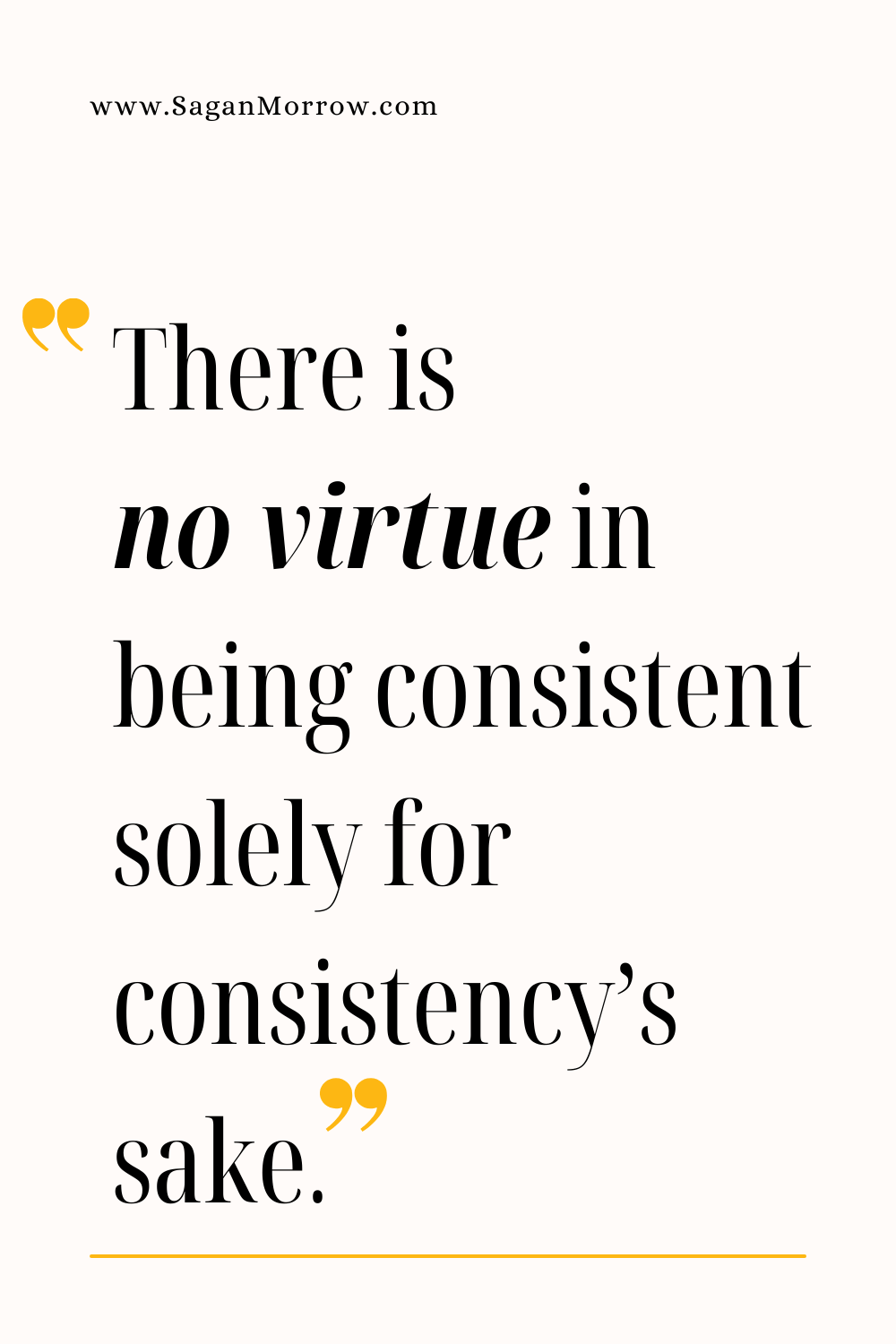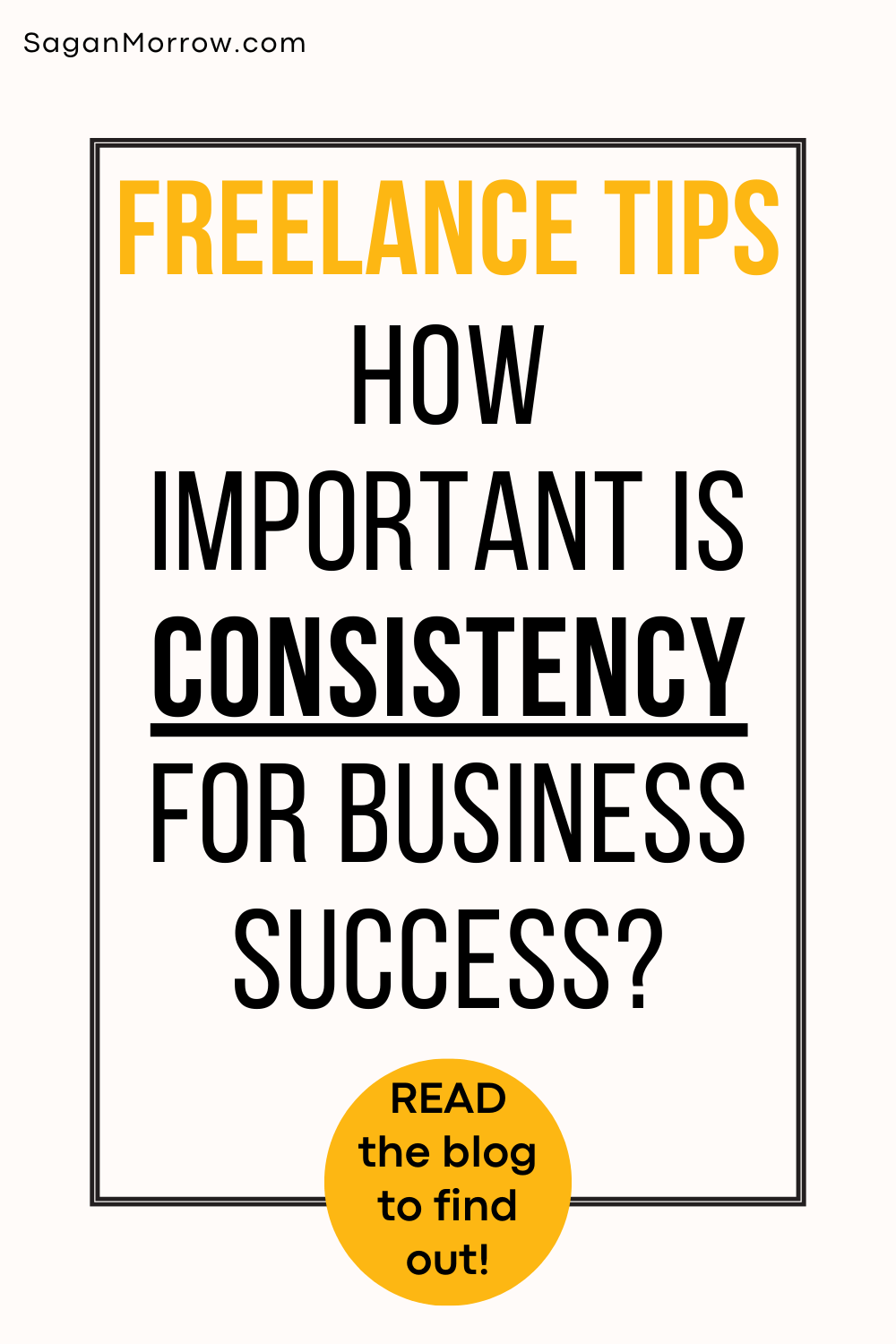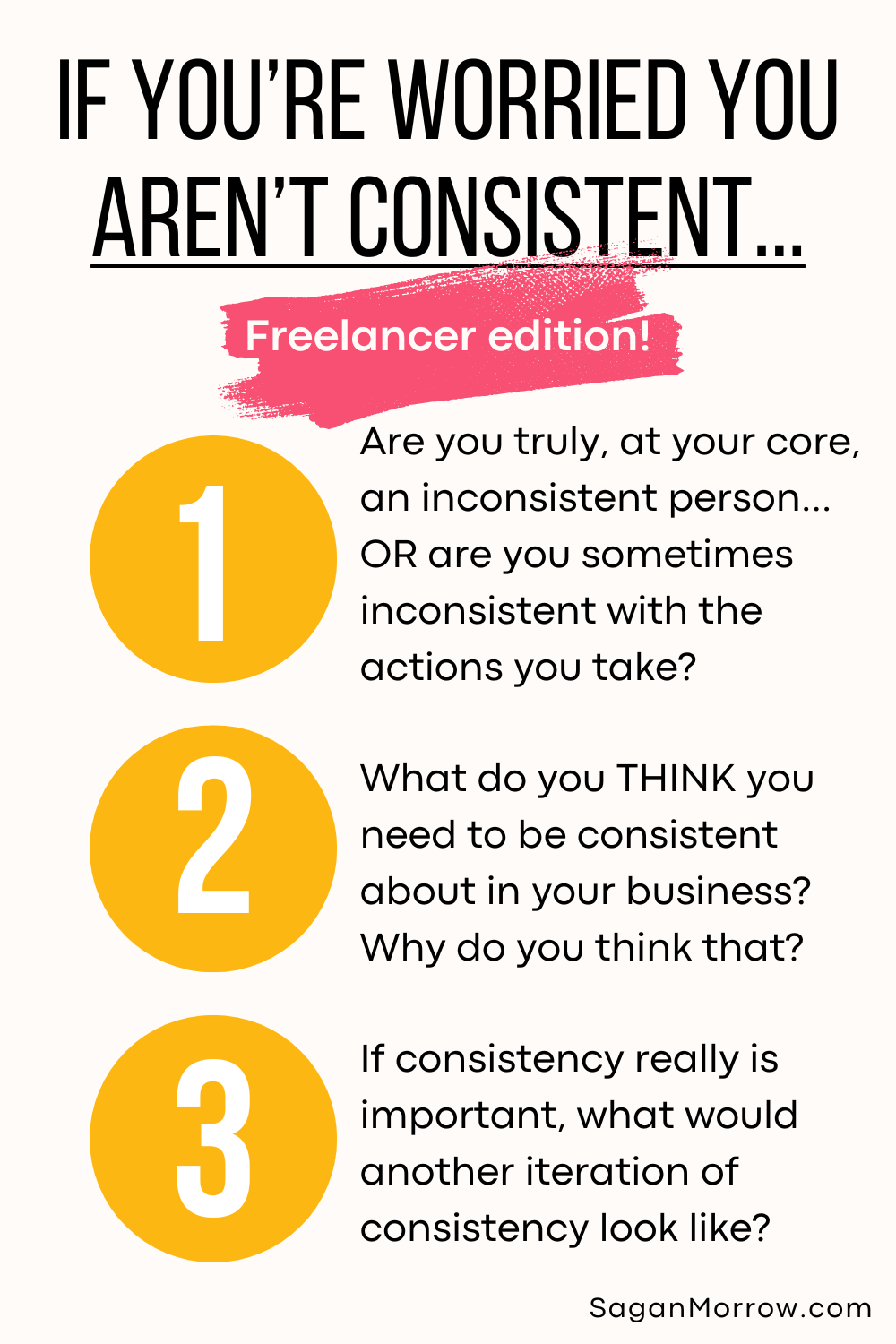How important is consistency in business? Does consistency matter in business success? Especially when you have a solopreneur business, you might find that you struggle with consistency — so does that mean it’s the end of the world?
Let's talk about that in this article!
Topics we address and what you get in this blog post:
- Video version of this article!
- Perfect for you if you prefer watching to reading.
- What's BENEATH the worry about being inconsistent.
- The truth about consistency, after we remove it from toxic productivity and hustle culture.
- 3 things that are BETTER for you to focus on rather than fretting about consistency.
- A bonus question to ask yourself (this might surprise you!)
- 3 steps for improving productivity and doing what you WANT to do.
Who am I to speak on this?
As an anti-hustle Productivity Strategist and Life Coach for solopreneurs, I often work with people — just like you — who struggle with time management, work/life balance, and staying focused and on track with goals.
You WANT to do the things you say that you'll do... but taking ACTION on your ideas isn't always easy.
You aren't alone in feeling that way! This blog post is a really good starting point for you to begin adjusting your approach (and when you're ready, I recommend that you book your coaching sessions with me so we can take this to the next level).
Watch the video version of this blog post:
Show notes:
- 0:00 Overview of this video.
- 0:18 Topics we’re addressing today!
- 0:45 Introduction to Sagan (your anti-hustle Productivity Strategist and Life Coach for solopreneurs)
- 1:19 What you're REALLY saying when you think, “I'm not consistent.”
- 2:39 The truth about consistency is that it's wrapped up in toxic productivity!
- 3:24 Why “consistency for consistency’s sake” ISN’T very useful.
- 4:29 Top 3 questions to explore that are much more useful than focusing solely on consistency in your solopreneur business.
- 6:28 Bonus question for assessing whether a task is “worth it.”
- 7:16 3 steps for improving productivity — starting NOW.
What you're REALLY saying when you think, "I'm not consistent."
“I’m not consistent.”
Have you ever said that?
Over the years, I’ve had multiple clients come to me with that concern, worried that they won’t be able to be a productive, successful solopreneur if they lack the skill of consistency.
“I’m not consistent.” → Those 3 words speak VOLUMES ♥
For instance, here are some of the things that may be underlying that sentence…
- “What does it SAY about me if I’m not consistent? That must mean I have no ability to be disciplined. That's so shameful.”
- “If I’m not consistent in my business, I won’t be able to keep it afloat. RIP to my business; I guess this isn't going to work out.”
- “Inconsistency is synonymous with laziness/failure, therefore I must be lazy or a failure.”
There's a lot to unpack here! This is why it's so important to understand what's beneath the surface, so we can work through what you're making it mean about you when you believe that you "just aren't a consistent person."
What you think about yourself, and your mindset about your relationship to business, DIRECTLY affects the actions that you take.

The truth about consistency (it's wrapped up in toxic productivity!)
From the perspective of traditional toxic productivity, “consistency” is the holy grail and the secret to business success.
If you are stuck in hustle culture, or listening to experts who have not yet learned about anti-hustle productivity, then you might hear something like this:
How important is consistency in business? “It’s EVERYTHING!”
Does consistency matter in business success? “OF COURSE IT DOES.”
*facepalm*
Nearly every productivity expert out there (except for yours truly!) touts the value and importance of consistency for business success — it’s no wonder that it causes worry for you!
But as with anything in life or business, consistency for consistency’s sake isn’t much use.
Why? Because it doesn't take into account things like:
- What that consistency will actually DO for you.
- Whether that particular task you're being "consistent" at actually contributes to your goals or is helpful for your business.
- Critiques, assessments, and audits of the work you're doing (in case something stops working!)
There is no point — and no virtue — in being consistent “just because.”
Yes — it's VERY important to follow-through on what you said you'd do, in terms of client deliverables or customer satisfaction, for example.
...But does that mean you need to keep doing what you've always been doing just for the sake of it, or that you should force yourself to do busy work that doesn't support your business goals? No!
(Especially not if you want a cozy business and to escape toxic hustle culture!)
Here are a few things that are more USEFUL than "consistency" to consider, if you’re worried about not being a consistent person:
- Are you truly, at your core, an inconsistent person… OR are you sometimes inconsistent with the actions you take?
- The ACT of consistency is different from the BEING of consistency!
- What meaning are you associating with the concept of “consistency”? (e.g. You may have toxic productivity hustle culture to unpack if you consider inconsistency to be synonymous with being a failure or being lazy)
- What do you THINK you need to be consistent about — and why do you think that?
- This is about looking at the value and usefulness of consistency (and also having PROOF that consistency is important in this particular area)
- What are alternative ways of viewing consistency? (e.g. Shifting your mentality from a toxic productivity standpoint into a more anti-hustle approach)
- If consistency really is important, what would another iteration of consistency look like?
- In this instance, you are changing how you approach consistency and how you define it.
- E.g. If you view consistency on social media as the frequency within which you publish new posts, you might want to expand or contract your understanding of time to accommodate for a broader definition of “consistency.” (We dive more into this topic around the 19-minute mark in my free Intuition Activated masterclass.)
In this case, the answer to “Does consistency matter in business success? How important is consistency in business?” is…
It depends ♥

Bonus question for assessing whether a task is "worth it"
Another question I like to ask myself is this, when assessing whether a task is "worth it" for attempting to be consistent at:
Can I handle my "must-do tasks" on my low energy days?
Energy management matters!
For example: My offers and business structure are designed with my LOWEST energy days at the forefront.
I have chronic anxiety, insomnia, and nightmares, so I need to be particularly mindful about being low-energy.
This is good to plan for in general, because sometimes life throws something unexpected at you — and if you are already creating everything in your business with that possibility in mind, it won't derail you or your progress!
If I were a naturally high-energy person — or if I wasn’t being strategic with energy management — my solopreneur business structure, services, and products would look VERY different!
3 steps for improving productivity:
- Do an assessment of your “must-do tasks,” business structure, services, products, systems, and processes: What energy level are they each designed to support?
- You can organize them into 2 or 3 columns to assess them visually, if that's helpful for you (e.g. low energy, medium/regular energy, and high energy)
- Explore options for reworking your business structure, services, etc so that it is better suited to supporting you on lower energy days.
- What would your business structure, systems, offers, etc look like if you assumed you weren't going to have ANY high-energy days (or if you assumed you were ONLY going to have low-energy days)? How does that differ from your current schedule or task list?
- Get help with this: Productivity Powerhouse is the best place to learn how to do this (with templates, examples, and step by step guides to make it simple for you to implement... You don't need to do it on your own!)
Productivity Powerhouse is your #1 resource for anti-hustle productivity, solopreneur work/life balance, and personal fulfillment — so you can get more done in less time AND produce higher-quality work than ever before, WITHOUT the overwhelm or burnout!

